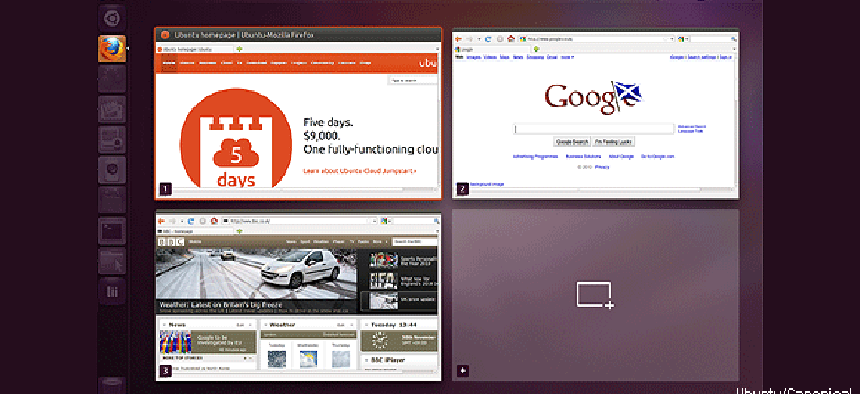Ubuntu 12.10: Windows 8 for the open-source crowd?


Connecting state and local government leaders
Canonical's latest desktop and server Linux versions add capabilities for the cloud, Internet and use on multiple types of devices.
I’ve always thought that Ubuntu was one of the cleanest flavors of Linux, but it wasn’t always the most cutting-edge. The release of Ubuntu 12.10 and Ubuntu Server 12.10 could change that, adding more Internet capabilities to the desktop and more cloud optimization to the server side.
And with Ubuntu joining Red Hat and other flavors of Linux in being approved for use by the federal government, the new release could help it increase its installed base with feds.
For the desktop, Ubuntu 12.10 now considers files in multiple locations when searches are made, according to announcement from the company. This includes programs and files stored on a hard drive and those that may reside on the Internet. It also matters little what type of device Ubuntu is running on, as it works for tablets and notebooks as well as full-size desktops.
Jane Silber, the CEO of Canonical, which develops Ubuntu, made the case that the new desktop version of its Linux software was a good alternative to Microsoft Windows 8, which is moving down similar platform-agnostic lines.
“Ubuntu 12.10 is the operating system for the multi-device era. It makes life significantly easier for users by adapting Ubuntu to the way people really access their content today: online and on the hard drive, at work and at home, on the phone and, of course, on the PC,” Silber wrote in the company’s announcement. “As consumers and businesses consider their upgrade options, Ubuntu 12.10 offers an easier, faster alternative to competing desktop operating systems.”
The company took some heat earlier when it was revealed that some of those Internet-based search results were going to come from Amazon. Canonical countered that the Amazon search results returned in the Dash part of the program could be uninstalled, and that Canonical needed the money — it gets paid a small fee when users purchase goods thorough the OS — to help fund further development and keep Ubuntu completely free.
On the server side, which was released at the same time as the desktop version, the emphasis is on working with the cloud. Much of that optimization was achieved by letting administrators choose what programs they wanted to add to their Ubuntu servers at the install, instead of forcing them to put, for example, MySQL in by default. At the same time, making Ubuntu Server 12.10 integrate with OpenStack Folsom means that moving to the cloud does not mean having to move away from open-source development.
“Enterprises shifting to cloud-based infrastructure and those testing and developing on clouds need the latest, cutting-edge technologies to deliver performance at little effort and cost,” Silber wrote. “Ubuntu Server 12.10 combines the latest time-saving tools from Ubuntu with the newest release of OpenStack, making it the fastest and easiest way to take advantage of the latest open cloud technology. Ubuntu Server is the reference operating system for OpenStack, which means no other operating system will work with Folsom as naturally.”
Juju, Ubuntu’s service orchestration tool, is now natively supported on OpenStack clouds running on Ubuntu. This means it can also be used on public clouds powered by Ubuntu, such as Hewlett-Packard’s. So adopters can use Juju on many more public clouds, which in turn makes it easier to migrate their deployments from one cloud to another without disruption.
Ubuntu desktop, server and cloud services can all be downloaded for free from the Ubuntu site.
NEXT STORY: Where is all that agency data coming from?




